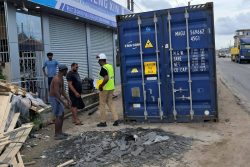What one had hoped might have been a comprehensive update on the pace of progress towards the completion of the eagerly awaited Regional Food Terminal coinciding with last month’s 2023 Barbados Agro Fest event, did not materialize. This observation should not be taken, in the least, as an indication of diminished diligence of the architects of the project or of the pace of progress towards the completion of the eagerly-awaited regional food facility. It is one of those out-of-an-abundance-of-caution concerns that we in the Caribbean must now learn to develop on account of our historical experience. Given the historical proclivity of our leaders for missed deadlines and abandoned undertakings we must now begin to do much more than we have previously done to seriously hold their feet to the fire.
One might have thought that this year’s recently concluded Barbados Agro Fest event might have been a suitable forum for a comprehensive update by Barbados and Guyana on the pace of progress towards the full and final completion of the creation of the Food Security Terminal. That did not happen and while the two project ‘leaders,’ Prime Minister Mia Mottley of Barbados and President Irfaan Ali may not be lacking in determination to push the project through in the shortest possible time, a reliable update on the pace of progress towards that landmark would have been reassuring at this time.
Such a report would have reflected well with a Caribbean people who have, for far too long, had to survive on a diet of lofty undertakings which have ended in disappointment. In the instance of the Food Terminal the ‘anniversary’ of its launch has now passed without a comprehensive update on timelines within which we can expect the facility to be ‘up and running.’ Arguably, the closest that we have come to this has been the recent pronouncement by Barbados’ Chief Agricultural Officer Keeley Holder (reported in the Stabroek News of March 10) in which she sought to underscore her government’s continued commitment to the full and final completion of the project.
Contextually, however, a more profound disclosure on a timeline for the Food Terminal becoming operational has become important for two reasons. The first one has to do with the context within which the decision to launch the facility was made in the first place. It had coincided, roughly, with a worrying disclosure by the World Food Programme (WFP) that parts of the Caribbean were facing serious food security challenges, an eventuality which, as a region, we had certainly not, up until then, appeared to take seriously. The second reason has to do with the fact that precedent in terms of collective food security undertakings here in the Caribbean, does not, in itself, provide any overwhelming reassurance that this time around ‘ambition’ will become reality. Constant reassurance is needed.
One acknowledges, of course, the various indications that have come from Barbados and specifically from Prime Minister Mia Mottley regarding her government’s commitment to the Food Terminal, though, here again, the full and final execution of the project will extend way beyond the creation of the infrastructure within which it will function. It will have to embrace, as well, both the food production and logistical frameworks within which it will have to operate.
That said and however much we may try to wish away what has gone before in relation to collective regional efforts, it would be foolhardy not to allow our extant undertaking to be guided by precedent. Here, if one is to be brutally frank, regional food security ‘ambitions’ have been underpinned, mostly, by strident political noises and dreamed-up structures which never really captured the commitment of the Caribbean as a whole. The whole focus revolved around grandiose ideas built around ‘structures’ that simply never got over the hurdle of bureaucratic conceptualization.
There are those who would contend that Guyana, possessed of food production capabilities that far exceed those of any of the rest of the CARICOM member countries has led the regional food security ‘charge’ erratically, allowing the initiative to become enmeshed in bureaucracy and ambitious but, in the final analysis, unrealized undertakings. Wishful thinking, to put it bluntly.
Ironically, with the region now confronted with food security challenges the extent of which are widely believed to be far more serious than anything that it has confronted in its history, it is to Guyana, with its historically robust agricultural credentials and, more recently, its ‘oil wealth’ that has now positioned itself as by far the fastest growing economy among member countries of CARICOM. While some may argue that those requisites ‘qualify’ the country to lead the way in significantly shoring up the region’s food security credentials, others will contend that it was under Guyana’s presumed leadership that previous attempts to build a robust regional food security infrastructure crashed and burned. What this has proven is that rich agricultural traditions, fertile soils, excellent climate, plentiful land and, more recently, the energy capability to be the powerhouse of food-processing in the region, do not, alone, qualify Guyana to lead the regional food security charge. Focus and commitment are also necessary.
In the circumstance of what, over the years, has been the continual erosion of popular trust here in the Caribbean in entirely leaving to governments the responsibility for delivering important undertakings to agreed deadlines, (and there can be few more important undertakings for the Caribbean at this time than the Food Security Terminal) what is needed is a mechanism through which the feet of the governments responsible for the execution of the project, be held firmly to the fire. This can only be done through the setting of strict timelines for the completion of the remaining phases of the Food Terminal undertaking and the creation of reliable mechanism that requires the delinquent parties to explain their failing to the region as a whole.







